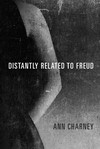
Distantly Related To Freud
Ann Charney
Cormorant Books
$21
paper
314pp
978-1-897151-30-3
The protagonist of Distantly Related to Freud is Ellen, eight years old and rather clever for her age. Being the only child of an expatriate widow who believes that fresh starts solve most dilemmas, she has lived a transitory, if hermetic, life. That is, until refugees from her mother’s homeland arrive one snowy day to board in her house, bringing with them unspoken histories filled with distress and outrage. Ever watchful and ruminative, Ellen starts to learn that appearances are indeed deceiving, and that life can be at times ambiguous and abruptly altered. It’s a lesson that piques her curiosity and, ultimately, her desire to become a writer. “It was no longer my ambition to make life resemble the orderly narrative lines that I had once found so satisfying in storybooks,” she confesses.
As the novel’s title suggests, Ellen shares a remote kinship with Sigmund Freud, but its significance to her life (like much in her mother’s past) eludes her at first. For the reader, though, coming-of-age novels often provide a natural thematic canvas for Freud’s triptych portrait of the human psyche. Whether it’s childhood’s impish id, the “la-di-da” superego of adolescence, or the awakening ego of adulthood, Charney paces Ellen’s formative years with the fluidity of a brushstroke.
Many of the plot elements in Distantly Related to Freud are typical of its genre. Ellen, an outsider because of her upbringing, becomes best friends with a girl of a similar background at a new school. She falls in love for the first time during a summer trip. She moves to New York City to be a writer. And in her travails, she learns about the complexities of becoming an adult. But Ellen’s life has its share of non sequiturs, too, including the sudden disappearance of her best friend and a mystery surrounding a girl killed by a train. Throughout, seasons change and years pass, their transitions revealed (rather than announced) only in catch-me-if-you-can details like hairstyles and popular books. Charney’s crisp prose brings it all together neatly, and the story maintains the plausibility and earnestness of a biography. It’s the kind of book, in fact, which Ellen yearns to write.
In many ways, Distantly Related to Freud is an old-fashioned novel. That’s not necessarily a condemnation. Its style and narrative owe more to the books of J.D. Salinger and Harper Lee than to contemporary writers. Better still, it’s not often that one can recommend a book based on how well it reads with a cup of hot tea on a grey Montreal day. With its winsome protagonist and the palpable interplay between innocence and the shadows that encroach on it, Charney has written one of the most endearing novels of the season. mRb






0 Comments